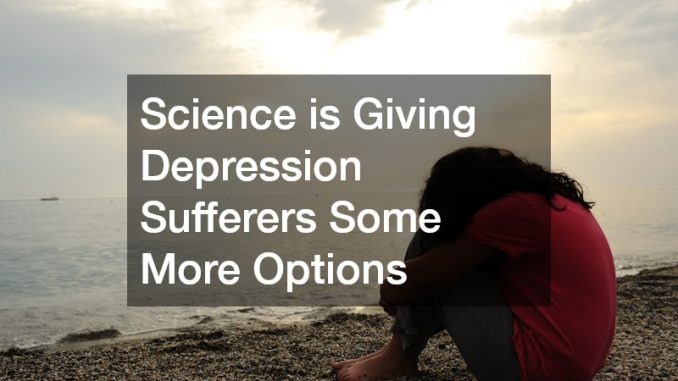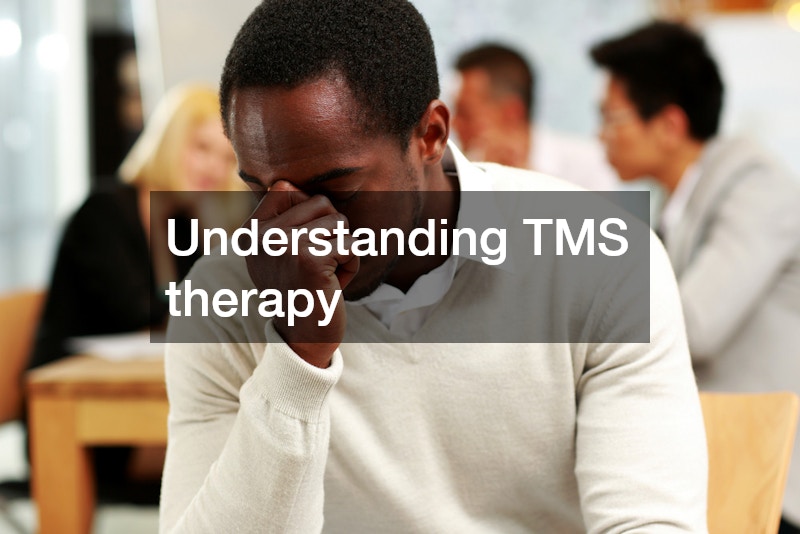

Updated 9/3/24
Depression afflicts many Americans, and the number of people struggling with depression has been steadily increasing. According to CNN, almost 20% of Americans report being diagnosed with depression at least once during their lives. When depressed Americans seek help from doctors, they may receive medication to help them cope. A new treatment making a difference in the lives of clients with depression is called TMS therapy.

According to Healthline, TMS (transcranial magnetic stimulation) is a brain stimulation treatment using electromagnetic pulses to help clients with mental health challenges, including depression. There are pros and cons of TMS. According to the Huntsman Mental Health Institute, TMS is desirable because it’s noninvasive, and there are typically few side effects. Less desirable aspects of TMS include the delay of results until four to six weeks after treatment.
TMS is one of the brainwave innovations now being used by doctors who work with depressed clients. According to VeryWell Health, when doctors consider TMS vs antidepressants, they typically use TMS when antidepressants are not effective. You may wonder, How long does TMS last? According to Healthline, treatment will continue for four to six weeks, and the benefits may last six to twelve months.
The Role of Alcohol and Drugs

In the United States of America, drug and alcohol addiction are quickly becoming epidemics. It is hard to pin down exactly where it all starts and there is no particular part of the country that lends itself, particularly to addiction. What we do know is that many more people, every year, need help breaking the addiction cycle.
Treatment centers are available around the nation and drugs to help you get off drugs are being developed all the time. For many, addiction can be so powerful that it be extremely difficult to get their lives back on track. Opiate addiction programs, cocaine addiction treatment, and using

In the United States of America, drug and alcohol addiction are quickly becoming epidemics. It is hard to pin down exactly where it all starts and there is no particular part of the country that lends itself, particularly to addiction. What we do know is that many more people, every year, need help breaking the addiction cycle.
Treatment centers are available around the nation and drugs to help you get off drugs are being developed all the time. For many, addiction can be so powerful that it be extremely difficult to get their lives back on track. Opiate addiction programs, cocaine addiction treatment, and using ibogaine for depression can help to a very large extent, but it all comes down to how willing someone is to get and stay clean.
In 2013, it was found that over 130 million people consume alcohol on a regular basis. Whether this is due to stress or anxiety, alcohol consumption is not going away anytime soon. Many are or are on their way to becoming addicts. There are over 20 million Americans over the age of 12 who are addicted to something, whether it be drugs (legal or illegal) or alcohol. This might seem like a lot of people because it is a lot of people. Only one person addicted is one person too many. The truth is, there is a battle being fought for the lives of millions of people; their lives are shattered by alcohol and drugs.
The good news is that we are making strides toward making progress. Treatment programs are more prepared when taking on new clients. They are beginning to use ibogaine for depression, alongside group therapy and talk therapy to try to heal the entire person.
Any addict will tell you that when they first get sober, it is not an easy road to go down. The first few days can be especially difficult. You are detoxing from the booze or drugs and that can freak your body out. It is used to getting its hits and when they don’t come quickly enough the body reacts, sometimes violently.
After the initial battle with the detox and the body feeling better, the mind jumps in to take a turn. This can be, and often is the time that depression pitches its ugly tent and tries to squat for as long as it can all about your life. More and more doctors are beginning to use ibogaine for depression these days, and that is helping with the recovery process.
But depression is not always caused by the breaking away from the addictive substances. Depression and other mental illnesses can actually bring on the addictive behaviors that manifest themselves into full-blown addictions. The mental illnesses, depending on what they are, can make a person want to mask how they are feeling. They then turn to drugs and/or alcohol to make the feelings go away, to just numb the pain.
Let’s all hope that we can make the world a more healthy place to be. And sometime soon!